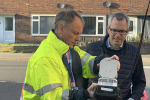
Unleashing Rural Productivity document launched
Communities and businesses in the most remote areas will benefit from better access to wireless networks thanks to plans announced today as part of the government’s wider drive to grow the rural economy.
A new £7 million fund will test out new ways to bring together satellite, wireless and fixed line internet connectivity, helping support farmers and tourism businesses to access lightning fast, reliable connectivity in remote areas for the first time.
The results of the new approaches will also help rural businesses in trial areas make the most of new agricultural technologies by improving connectivity on their land, for example using new drone technology to monitor crops and livestock in real-time, support landscape and wildlife conservation efforts, or develop interactive experiences for tourists.
The new fund comes alongside the government’s commitment earlier this year to deliver improved, high-speed broadband via satellite connectivity for up to 35,000 homes in the most remote parts of the UK through an £8 million grant scheme, giving them a broadband connection that will be up to ten times faster than what is currently available to them.
The fund is one of a broad range of steps the government is taking to boost rural communities on housing, transport, digital connectivity and jobs as set out in a new publication today. Unleashing Rural Opportunity which outlines how government will deliver the Prime Minister’s priority to grow the economy, creating better-paid jobs and opportunity right across the country. Rural areas already contribute 15% to England’s economy, which amounts to over £250 billion of our national GDP, but the programme seeks to unlock further growth.
Prime Minister Rishi Sunak said:
I have pledged to build a better future for people in this country, and our rural communities are right at the heart of that promise.
That’s why I’m determined to make sure that their interests are front and centre of all our work to grow the economy and strengthen our communities – so that every part of our country gets the support it needs to thrive.
To boost the supply of new affordable housing to rent or buy in rural areas, government will create a network of new “Rural Housing Enablers” to act as honest brokers between developers and communities. Backed by £2.5 million of funding, they will help to identify sites with local support for development and in keeping with the local area.
Government will consult on making it easier for farmers to change their redundant agricultural buildings into family homes by cutting red tape. Planning rules could be changed to provide a more generous threshold delivered through the more streamlined planning process, while providing local authorities with new powers to safeguard against second homes and holiday lets.
Split across four broad themes of housing, communities, connectivity and growth, the plan will help create jobs and drive growth in rural areas, including proposals to expand internet provision and scale up the availability of housing in rural communities. It also includes plans to:
- Consult on further steps to help remote communities get online by encouraging the provision of fixed wireless access and satellite services.
- Improve local transport networks through a Future of Transport Rural Strategy, which will set out plans to improve access to services, tackle isolation and increase access to jobs in rural and remote areas. The Government will also consult on reforming grant funding for bus operators to help them keep fares low and service levels high, helping to protect vital rural routes.
- Help more communities access funding for village halls, by extending the scope of the Platinum Jubilee Village Halls Fund from Autumn 2023 by lowering the minimum grant threshold to £2,000
- Publish a new public libraries strategy for England in 2024, recognising the role as they play in many rural areas as hubs for local services and digital connectivity.
- Review how deprivation in rural areas is measured so that it is better understood and taken into account in decision making – ensuring the interests of rural communities are better represented.
- Legislate by the summer to increase fly-tipping and litter penalties and consult key stakeholders on ringfencing the use of these fines to fund further action on fly-tipping.
- Additional funding for the NPCC’s new national rural crime unit, to help cut crime and keep communities safe, by tackling anti-social behaviour, equipment theft and a new funded role to tackle fly-tipping.
- Continue to make great progress in improving broadband and mobile coverage in rural areas by delivering the £5 billion Project Gigabit across the UK at pace, including plans to procure all regional contracts in England by the end of 2024.
- Publish a Dental Plan shortly which will set out further reform to improve access to NHS Dentistry, including in rural areas which may find it particularly hard to recruit and retain dentists and other dental care professionals.
- Support electricity infrastructure in rural areas, making sure it keeps up with the changing needs of consumers for example, to support the electrification of heating and EV charging by publishing further plans to accelerate electricity network connections.
- Consult shortly on a new fund to help smaller abattoirs to improve productivity and enhance animal welfare, aiming to open a fund for applications later this year.
- Consult on planning changes to make agricultural development more flexible for farmers so they can amend their existing agricultural buildings to make them more productive more easily.
The plan builds on significant government action since 2010 to support rural communities.
This includes:
- In March it announced the grant awards of the Rural England Prosperity Fund, a £110 million rural top-up to the UK Shared Prosperity Fund to support levelling up across the UK. It will support initiatives such as farm diversification, projects to boost tourism, and community infrastructure projects such as electric vehicle charging stations.
- Huge improvements have also been made over the last decade to support connectivity in rural areas. Over 75% of UK premises can now access gigabit-capable broadband, [up from 6% at the beginning of 2019], and over 730,000 premises have already been upgraded in hard-to-reach rural areas as part of our £5 billion Project Gigabit investment.
- Investing, jointly with industry, £1 billion in the Shared Rural Network to improve 4G mobile coverage throughout the UK to reach 95% geographic coverage by the end of 2025.
- Help for rural low-income households to move to cheaper heating. Up to £378 million is being made available in grants, ring-fenced for rural areas, to fund energy efficiency and clean heating upgrades for low-income households living off the gas grid in England.
- Help those who have to travel furthest to college each day by increasing our funding for bursaries for 16-19s by 10% for the 2023/24 academic year.
- Cracking down on fly tipping with increased background checks for firms who move or trade waste, mandatory digital waste tracking as well as making it easier for regulators across the UK take action against rogue operators.
- Legislating to introduce tougher penalties and more effective enforcement tools to tackle the barbaric illegal practices of hare coursing.
- Government delivering on its manifesto commitment to recruit 20,000 additional police officers - the biggest increase in decades, helping ensure that the public is better protected, including in rural communities.
- Support farmers to diversify their businesses and reward them for sustainable farming practices through the government’s £2.4bn-a-year environmental land management schemes.
- Expanding the country’s nature reserves and nature network, which in turns provides opportunities for increased eco-tourism.
- Delivering better and more accessible care in rural areas. This includes taking action to increase the number of doctors and primary care staff in under-served areas and supporting community pharmacies in areas that are more sparsely served through the Pharmacy Access Scheme.
- Supporting farmers’ mental health and wellbeing as an outcome of our Future Farming Resilience Fund, which supports farmers and land managers during the early years of agricultural transition, alongside the £2.3 billion extra a year being invested into the expansion and transformation of mental health in England.
- Plans to cut the red tape currently holding farmers back from delivering projects on their land to diversify their incomes, such as repurposing farm buildings to use as shops,
- A new framework for trade negotiations which puts farmers’ interests at the heart of trade policy by committing to protect the UK’s high food and welfare standards and prioritise new export opportunities.
- Providing £2m to boost our programme of global trade shows and missions, as well as providing £1.6m for the GREAT food and drink campaign, to support world leading British food and drink producers to export.
The statement builds on DEFRA rural proofing work where by all government policy is examined to ensure it is delivering for rural communities. The next rural proofing report will be published later this year.


